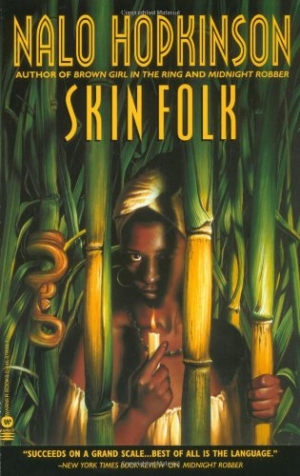Birthday Reviews: Nalo Hopkinson’s “Whose Upward Flight I Love”

Nalo Hopkinson was born on December 20, 1960 in Kingston, Jamaica.
Hopkinson’s first novel, Brown Girl in the Ring, won the first Warner Aspect First Novel Contest in 1997 and led to its publication. In 1999 Hopkinson won the John W. Campbell Award for Best New Writer. She won the World Fantasy Award for her collection Skin Folk and she shared the British Fantasy Award for co-editing the anthology People of Colo(u)r Destroy Science Fiction with Krisitne Ong Muslim. Hopkinson’s novel Sister Mine won the Andre Norton Award in 2015. She shared the Aurora Award for co-editing the anthology Tesseracts Nine with Geoff Ryman and won her own Aurora Award for the novel The New Moon’s Arms. Her novel The Chaos won a Copper Cylinder Award and she won a Gaylactic Spectrum Award for The Salt Roads. She has won the Sunburst Award twice, for the collection Skin Folk and the novel The New Moon’s Arms. She has collaborated on fiction with Nisi Shawl and his co-edited anthologies and magazines with Kristine Ong Muslim, Geoff Ryman, and Uppinder Mehan.
“Whose Upward Flight I Love” was originally published in Dark Planet Webzine in 2000, edited by Lucy A. Snyder. Hopkinson included it in her collection Skin Folk the following year as well as her late collection Falling in Love with Hominids in 2015. It was reprinted in the magazine Cicada in March of 2017.
Hopkinson writes about a crew whose job it is to secure trees planted in a public park against a wind storm. Their task seems prosaic enough and they work even as the wind threatens to uproot the trees, to the extent that one of the women has to catch an uprooted tree before it flies away. Despite her efforts, all she winds up with is a root, which she tosses to the ground.
As the crew members work, they call to each other, continuing conversations about their lives. The woman has a long-time relationship with Derek, which has its ups and downs and she is sharing the latest information about their lives with her crewmate to pass the time while they do their work to protect the trees. Everything is completely normal and there is nothing that sets this particularly day’s work apart from any other day.
Decisions, and actions, have consequences, even if they can’t be foreseen. Consequences also often can’t be traced back to the decision that caused them. The crewmember catching the tree and then dropping the root on the ground is one of those. While she and her crewmates are finishing their task, the dropped root begins to move on its own.